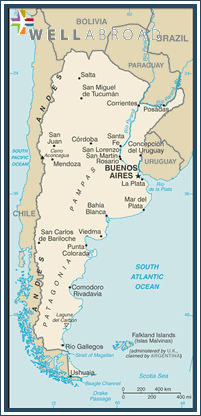|
MOST RECENT ALERTS
There's no recent alert.
|

|
|||||||||||||||
| COUNTRY OVERVIEW | ||||||||||||||||
|---|---|---|---|---|---|---|---|---|---|---|---|---|---|---|---|---|
|
| COUNTRY GENERAL INFORMATION | |||||||
|---|---|---|---|---|---|---|---|
| Language: |
Spanish (official), English, Italian, German, French |
||||||
| Currency: | Argentine peso (ARS) | ||||||
| Predominant Religions: |
nominally Roman Catholic 92% (less than 20% practicing), Protestant 2%, Jewish 2%, other 4% |
||||||
| National Holidays: | Revolution Day, 25 May (1810) | ||||||
| Economic Status: |
Argentina is a medium-income nation that continues to emerge from a major financial crisis suffered in 2001-2002. |
||||||
| Security: |
Argentine Army, Navy of the Argentine Republic (Armada Republica; includes naval aviation and naval infantry), Argentine Air Force (Fuerza Aerea Argentina, FAA) |
||||||
| US Presence: |
The US Embassy is located at Avenida Colombia 4300 in the Palermo neighborhood of Buenos Aires (near the Plaza Italia stop on the "D" line subway). The main Embassy switchboard telephone is (54) (11) 5777-4533. Recorded consular information, including instructions on whom to contact in case of an American citizen emergency, is available at tel. (54) (11) 4514-1830. The Consular Section fax is (54) (11) 5777-4293. The Consular Section is open to the public from 8:30 a.m. to noon and 2:30p to 4p Monday through Friday, except on American and Argentine holidays. Additional information on Embassy services is available on the Internet at http://argentina.usembassy.gov or by e-mail: BuenosAires-ACS@state.gov. |
||||||
| Document Requirements: |
A valid passport is required for US citizens to enter Argentina. US citizens do not need a visa for visits of up to 90 days for tourism or business. US citizens who arrive in Argentina with expired or damaged passports may be refused entry and returned to the United States at their own expense. The US Embassy cannot provide guarantees on behalf of travelers in such situations, and therefore encourages US citizens to ensure that their travel documents are valid and in good condition prior to departure from the United States. Different rules apply to US citizens who also have Argentine nationality, depending on their dates of US naturalization. For more information, check the Argentine Ministry of the Interior website at www.mininterior.gov.ar/migraciones/. Most dual nationals are permitted 60-day visits. Dual nationals who stay beyond their permitted time are required to depart on an Argentine passport. |
||||||
| Major Airports: |
Airports: 1,381, Airports w/paved runways: 154 Aeropuerto Internacional Ministro Pistarini de Ezeiza (EZE) |
||||||
| Servicing Airlines: |
|
||||||
| Risks and Precautions: |
|
||||||
| Mortality Statistics: |
|
||||||
| Immunization Indicators: |
Required: None |
||||||
| Infectious Disease Concerns: |
|
||||||
| Overall Quality of Medical Services: |
|
||||||
| Providers in Network: |
|
||||||
| Recent Medical Threats/ Concerns/Warnings: |
July 14, 2009
The Department of State alerts U.S. citizens traveling to or residing in Argentina of the health risks associated with the World Health Organization (WHO)-declared 2009-H1N1 influenza pandemic, which has resulted in illness in numerous countries. The current outbreak in Argentina has caused federal, provincial, and municipal authorities to announce several measures to prevent the illness from spreading. The Centers for Disease Control and Prevention recommends that Americans at high risk for complications of influenza and considering travel to areas affected by 2009-H1N1 influenza, such as Argentina, discuss their travel plans with their doctor. Together, they should look carefully at the 2009-H1N1 flu situation at their destination including available health-care options in the area. They should discuss their specific health situations and possible increased risk of traveling to the area affected by 2009-H1N1 flu. This Travel Alert expires on September 14, 2009. The Government of Argentina has announced a US$263 million effort to take action against the influenza outbreak. All of Argentina’s 23 districts and the city of Buenos Aires have extended school vacations, some by as long as a month. Twelve of Argentina’s districts, including the Province of Buenos Aires and the city of Buenos Aires, have declared administrative health emergencies. Throughout the country, authorities advise against attending events involving large gatherings of people. The media is issuing public health advice on a continuing basis. The federal government is updating measures on a daily basis and has not ruled out more restrictive actions. Groups at higher risk for seasonal influenza complications include: Not all respiratory illnesses are 2009-H1N1 influenza, but may be seasonal influenza or another illness. Specific questions or concerns about influenza or specific high-risk conditions should be directed to a medical professional. For additional information please consult the Department of State information on 2009-H1N1 Flu, the United States Centers for Disease Control and Prevention Website or the World Health Organization Website for information on how to avoid contracting the virus and how to treat it if infected. U.S. citizens also may call the Office of Overseas Citizens Services in the U.S. for the latest travel information. The Office of Overseas Citizens Services can be reached from 8:00 am – 8:00 pm Eastern Daylight Time, M-F, at 1-888-407-4747, or if calling from outside the U.S., at (202)-501-4444. For any emergencies involving American citizens, please contact the American Citizens Services (ACS) Unit of the U.S. Embassy’s Consular Section, located at 4300 Avenida Colombia, 1425 Buenos Aires; telephone+54-11-5777-4354; after hours emergency telephone +54-11-5777-4873; ACS unit fax +54-11-5777-4293; e-mail BuenosAires-ACS@state.gov . Americans living or traveling in Argentina are encouraged to register with the U.S. Embassy through the State Department's travel registration website, so that they can obtain updated information on travel and security within Argentina. Americans without internet access may register directly with the U.S. Embassy. |
||||||
| Communications Info: |
Country calling code: 54 |
||||||






